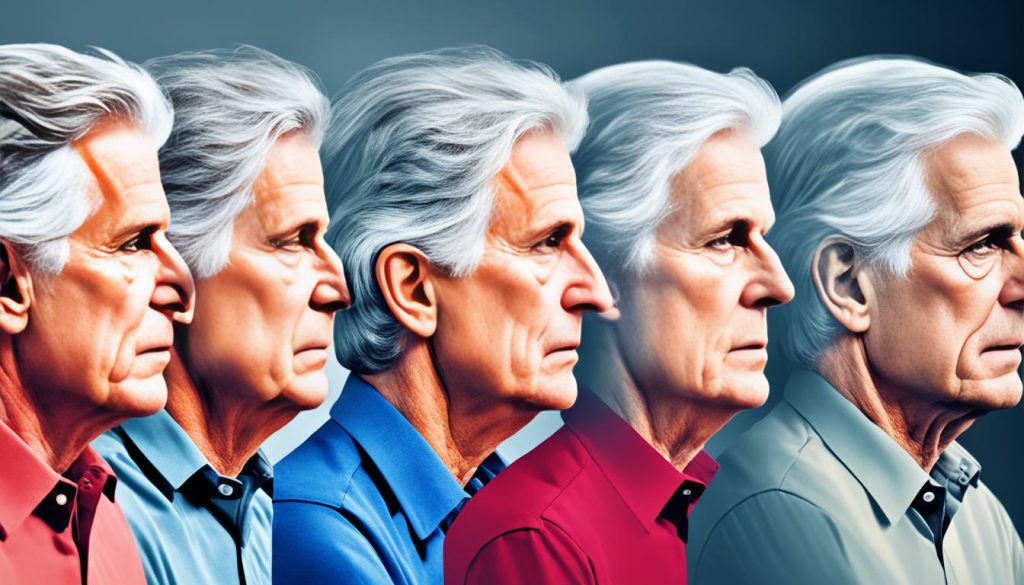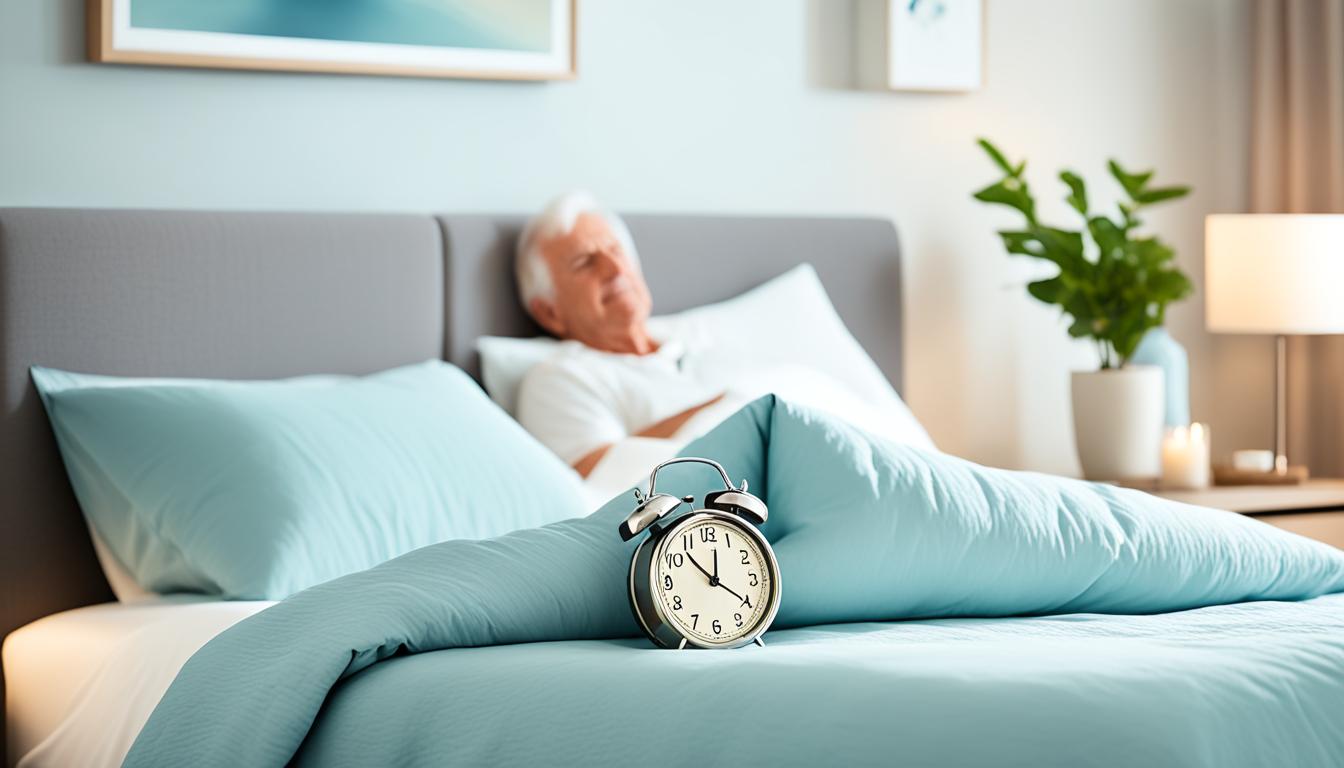Have you ever thought that better sleep could slow down aging?
Quality sleep is often ignored, but it’s key for our health as we get older. Studies from the National Sleep Foundation and Harvard Health Publications link good sleep to our bodies and minds feeling new again. As we age, sleep helps keep us healthy.
Getting enough sleep could make you feel young and full of life. But what role does sleep play in aging?
Quick Recommendation: Our blog takes you through how sleep and aging are interconnected. If you're interested in broadening your knowledge to include the subject of anti-aging as a whole, we recommend the Anti-Aging Hacks eBook.
Introduction to Sleep and Aging
As you get older, your sleep patterns change a lot. This is shown in studies like the Journal of Clinical Sleep Medicine. These changes are due to shifts in your body’s internal clock, or circadian rhythm. Knowing about these changes is key to staying healthy and feeling good as you age.

Your circadian rhythm is vital for good sleep. It controls your sleep-wake cycles and other body functions. As you age, disruptions to this rhythm can cause poor sleep and other problems. The Sleep Health Foundation says these issues are common in older people, making it important to learn more.
Studies show that sleep problems can affect your health in big ways. Chronobiology International looks into how aging affects your circadian rhythms. It shows how these changes can impact your brain, heart health, and more. Knowing this can help you improve your sleep as you age.
How Poor Sleep Affects Your Health
Poor sleep can really hurt your health, touching many parts of your well-being. Not getting enough sleep is more than just a bother; it has deep effects on your health that can lead to serious problems.
The American Journal of Epidemiology says not sleeping enough is linked to higher death rates. Not resting enough puts you at risk for chronic diseases like diabetes, heart disease, and high blood pressure. These issues can be very harmful, especially as you get older.

Poor sleep also affects your mind and feelings. Studies in Sleep Medicine Reviews show that not sleeping well hurts your thinking skills and makes emotional problems worse, like anxiety and depression. As you age, these problems can get worse, affecting your life quality.
The Centers for Disease Control and Prevention (CDC) warn about the risks of not sleeping enough. They say poor sleep weakens your immune system, making you more likely to get sick. Also, not sleeping well for a long time can cause permanent harm.
It’s important to know about these health risks to improve your sleep habits. By making sleep a priority, you can reduce these effects and get better overall health.
Biological Mechanisms Linking Sleep and Aging
Sleep and aging are closely linked through cellular repair. During deep sleep, your body fixes damaged cells and DNA. This process is key to preventing cellular damage, which is a big part of aging. Good sleep habits help your body repair cells well, fighting off daily damage.

Hormones also play a big role in this link. Sleep helps control hormones like growth hormone and cortisol. Studies in Nature Reviews Endocrinology show that growth hormone is highest during sleep. It helps with tissue repair. Bad sleep can mess with hormone levels, speeding up aging and hurting health.
Sleep is also vital for your immune system. As Annals of the New York Academy of Sciences explains, sleep boosts your immune system. It prepares you to fight infections better. Not getting enough sleep weakens your immune system, making you more likely to get sick and age faster.
Research in Neuroscience and Biobehavioral Reviews shows how sleep affects these processes. Good sleep supports your body’s repair, hormone balance, and immune function. These are key to fighting aging.
The Impact of Sleep on Cognitive Decline
It’s crucial to understand how sleep affects cognitive decline, especially for seniors. Good sleep quality is key to keeping your memory sharp and your brain healthy. Studies in the Journal of Alzheimer’s Disease show a strong link between poor sleep and cognitive decline.
Poor sleep can raise the risk of Alzheimer’s disease and dementia. Research in Brain Sciences stresses the need for good sleep habits to slow down age-related brain decline. Better sleep can help protect you from these serious brain diseases.

According to the National Institutes of Health, getting better sleep is crucial for brain health as you get older. Prioritizing restful sleep helps keep your mind sharp and your memory strong.
Quick Recommendation: Our blog takes you through how sleep and aging are interconnected. If you're interested in broadening your knowledge to include the subject of anti-aging as a whole, we recommend the Anti-Aging Hacks eBook.
Sleep Disorders Common in Aging Populations
As you get older, some sleep problems become more common. They can affect your health and happiness. Insomnia is one big issue, making it hard to fall or stay asleep. The Journal of Geriatric Psychiatry and Neurology says about half of older adults deal with insomnia.
They often feel awake for a long time, tired during the day, and restless.

Sleep apnea is another big problem for people over 65. The American Thoracic Society says more older people get sleep apnea. It happens when your breathing stops during sleep, which can really hurt your health.
Symptoms include loud snoring, stopping breathing, and waking up needing air.
Restless leg syndrome (RLS) is also more common in older people. It makes you want to move your legs a lot, usually at night. The Sleep Medicine journal says RLS gets worse with age, making sleep hard.
Knowing about these sleep issues is key to getting better sleep. There are many treatments, from changing how you live to seeing a doctor. Researchers are always finding new ways to help with these problems.
Tips to Improve Sleep Quality as You Age
As you get older, it’s key to keep your sleep habits good. Start by setting a regular sleep schedule. Going to bed and waking up at the same time every day can make your sleep better.
Try relaxation techniques before bed to help you sleep. Deep breathing, meditation, or progressive muscle relaxation can calm your mind and body. The Mayo Clinic says these methods can cut stress and help you sleep better.
Make your sleep space better for sleep too. Keep your bedroom cool, quiet, and dark. Turn off electronic devices, which can keep you awake with blue light. Think about getting a comfy mattress and pillows. The National Institute on Aging says these changes can help you sleep better.
Also, watch your sleep habits and lifestyle. Cut down on caffeine and alcohol before bed. Add regular exercise to your routine. These steps can make your sleep area and habits better for restful sleep.
The Role of Nutrition and Exercise in Sleep and Aging
As you get older, it’s key to know how nutrition and exercise affect your sleep. What you eat can make your sleep better or worse. Foods high in magnesium, calcium, and B vitamins help make melatonin, which keeps your sleep cycle in check. But eating too much caffeine or sugar before bed can mess up your sleep.
Staying active is also vital for good sleep as you age. A study in the American Journal of Lifestyle Medicine found that moderate exercise helps sleep. It makes falling asleep faster and deep sleep longer. This is great for older people who often have trouble sleeping well.
Getting the right balance between diet and exercise is key for better sleep and fighting aging effects. Eating healthy foods that boost melatonin production and exercising regularly can greatly improve your health. Creating a routine that includes both diet and exercise is crucial, as the International Journal of Tryptophan Research suggests.
Technology and Its Effects on Sleep Quality
Digital technology is changing how we sleep. A big worry is blue light exposure from screens, which can mess up your sleep. Older eyes are more sensitive to blue light, causing more sleep problems. A study in the Sleep Health Journal found that blue light affects melatonin, making it tough to fall and stay asleep.
Sleep tracking devices are getting popular with older adults to check sleep habits. Research in the Journal of Behaviors and Information Technology shows these devices give insights into sleep patterns. They track sleep length, quality, and disruptions, giving a clear view of your sleep health.
Also, digital relaxation tools like apps with guided meditation, white noise, and calming music are helping with sleep. The Journal of Clinical Sleep Medicine says these tools are great for you. They offer personalized programs to help you relax and sleep better.
Knowing how to use technology can greatly improve your sleep as you get older. By controlling blue light exposure and using sleep tracking devices and digital relaxation tools, you can get better sleep and feel better overall.
Conclusion
As we end this journey, it’s clear how crucial sleep is for staying healthy as we age. We looked at how not getting enough sleep can speed up aging. We saw how it affects our biology, thinking, and health.
We shared tips and changes you can make to sleep better. This includes eating right and exercising regularly. We also talked about how technology affects sleep and how to reduce its bad effects. Making small changes can really help improve your sleep and overall health as you get older.
So, here’s what you should do next: learn more about improving your sleep. Keep up with new research and advice from experts. By focusing on sleep, you’re not just hoping for better sleep tonight. You’re also investing in a healthier, happier future.
Quick Recommendation: Our blog takes you through how sleep and aging are interconnected. If you're interested in broadening your knowledge to include the subject of anti-aging as a whole, we recommend the Anti-Aging Hacks eBook.

